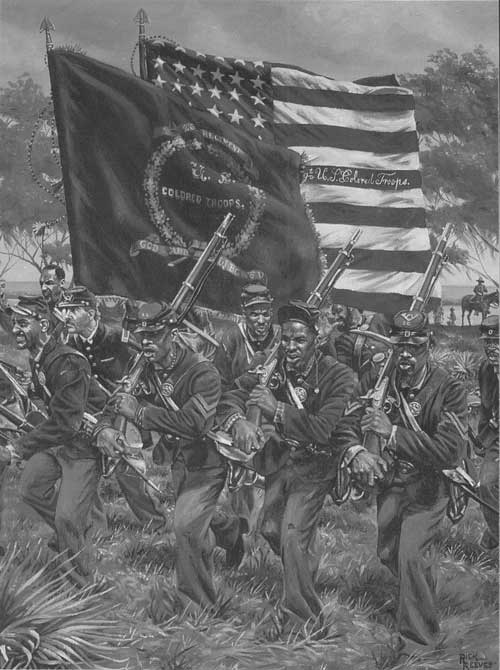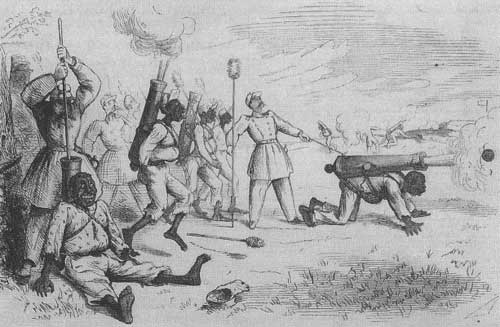|
THE TEST OF COMBAT
Both emancipation and black enlistment generated considerable
opposition. While some Northerners praised the decision to free the
slaves as morally proper and militarily sensible, many doubted its
legality and timeliness, Equally controversial was black military
service. Blacks and more liberal-minded whites perceived this as an
opportunity for African Americans to demonstrate their commitment to the
Union, disprove tightly held prejudices in the Northern states, and gain
full rights in the postwar world. More cynical Northerners did not
object. After all, "a black man could stop a bullet as well as a white
one," so the argument went, and "when Uncle Abraham gets his Niggers
armed and in the field he can get along without us." Probably a
majority, however, objected to the plan. "God never intended a nigger to
put white people Down," insisted a soldier whose view reflected a widely
shared opinion. The government would be wasting resources on men who
could contribute very little to Union victory. "I think a drove of hogs
would do better brought down here," commented a soldier, "for we could
eat them and the nigers we can't."

|
THE 26TH REGIMENT OF THE UNITED STATES COLORED TROOPS CHARGE IN BATTLE.
(PAINTING BY RICK REEVES, TAMPA, FL)
|
Throughout Northern white society, prejudice dominated attitudes on
black recruitment. There were doubts about the ability of black soldiers
to cope with the rigors of combat. Many whites argued that they lacked
the character to sustain themselves in battle, and attempts to convert
them into soldiers were preposterous. Others while not so vociferous,
certainly needed convincing.
At the core of conventional racial prejudices in the early 1860s was
an assumption that blacks were inferior to whites. They lacked character
and self-restraint, so whites believed. Men and women of African descent
were recently "removed from barbarism," and their latent savagery might
bubble up at any time. According to most whites, blacks lacked the
intellectually prowess of whites. Through proper cultivation and care,
and within the structure of Western civilization, it was thought that
they could become productive members of society, but they would always
lag behind the white race. Military training and discipline might
improve their self-reliance and control their latent savagery; it also
might desert them in times of crisis.

|
MANY NORTHERNERS RELIEVED THAT BLACK PEOPLE LACKED THE SKILLS FOR
COMBAT, AS ILLUSTRATED IN THIS RACIST CARTOON. (LC)
|
Such newspapers as the New York Times, in most respects an
organ of Lincoln's party, endorsed the use of black troops cautiously.
"Whether negroes shall or shall not be employed as soldiers," argued its
editors in February 1863, "seems to us purely a question of expediency,
and to be solved satisfactorily only by experiment." Until then, they
advocated restraint in the enlistment of black men, fearing that an
expansion of recruitment efforts at this time would merely be "adding it
to the cause of dissension already existing in the country at
large."
|
|
